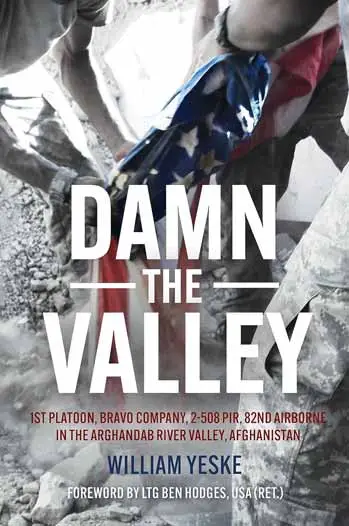By William Yeske.
Philadelphia: Casemate Publishers, 2023.
ISBN 978-1-63624-365-8.
Photographs. Index.
Pp. vi, 256. $34.95.
Damn the Valley provides first-person accounts of the realities of warfare experienced in the Arghandab River Valley in 2009-2010. The narrative focuses on the perspective of enlisted infantry of 1st Platoon, Bravo Company, 2d Battalion, 508th Parachute Infantry Regiment, 82d Airborne Division, during Operation ENDURING FREEDOM in Afghanistan. Author William Yeske captures the challenges he and his fellow soldiers endured and allows readers to immerse themselves in the time and conditions of how they conducted warfare, as well as the psychological effects the soldiers faced after returning home.
Individuals that prepare and deploy to a theater of armed conflict are exposed to a vast array of experiences. The personal accounts described in the text are a powerful reminder of the hardships U.S service members endured during the war in Afghanistan. Those searching for first-person accounts of the psychological impact of spartan living, coupled with the daily danger of ambushes and the Improvised Explosive Devices (IEDs) used by a determined and patient enemy, will find just such a genuine perspective in Damn the Valley. The realities of warfare become apparent immediately. Determination, fear, anger, anxiety, guilt, and confusion are all daily emotions described by the soldiers who faced the struggles of war. The normalization of death is an uncommon ideology for most in civilized society, but it becomes possible when death is a daily occurrence in life. This reality is shaped deliberately by an enemy that hides among the local populace, does not engage in direct conflict, and understands the value of psychological warfare. The soldiers’ mindsets were also altered by the perception that their leadership was disconnected with the truth of their reality on the ground. From the soldier’s viewpoint, days of patrolling, for the sake of patrolling, through IED laden areas of the valley was counterproductive and underlined the thoughts that their next step could result in death.
Yeske’s accounts describe the opportunity for soldiers to lose the ethical and moral foundations instilled in members of the U.S. military. The constant patrols, poor living conditions, death of friends, and very real possibility of their own demise make even the most resilient individuals question the purpose and legitimacy of the mission and its strategic value. However, they persevered by supporting each other and remembering they were there to protect the people of both the United States and Afghanistan from a barbaric enemy. The set of core values led to expanded resilience in the face of horrific physical and mental challenges.
Leaders currently serving in today’s military must take a decisive stance on supporting the mental health of soldiers. Commanders and senior noncommissioned officers have an inherent responsibility to mentally prepare soldiers for the realities of war, potentially using Damn the Valley as a case study. Soldiers returning from combat operations continue to fight their own version of the war. Many have difficulty trusting new individuals to their once tightknit team. Others find it difficult to reconnect with friends and family with whom they were once close. Yeske highlights the impact on many of his teammates, and the continued battle they face years after their departure from Afghanistan. Although the emotions are related to the events described in the text, it illustrates the significant impact that many service members face today.
Damn the Valley is written with passion that, at times, blurs the intended message. Although not academic in purpose, it is an excellent primary source regarding the U.S. tactics in the Argandab River Valley and the physical and emotional hardships of armed conflict. This book adds value to the larger collection of scholarship on the U.S. conflict in Afghanistan.
Master Sergeant John Visaggio, USA
St. Mary’s, Georgia
